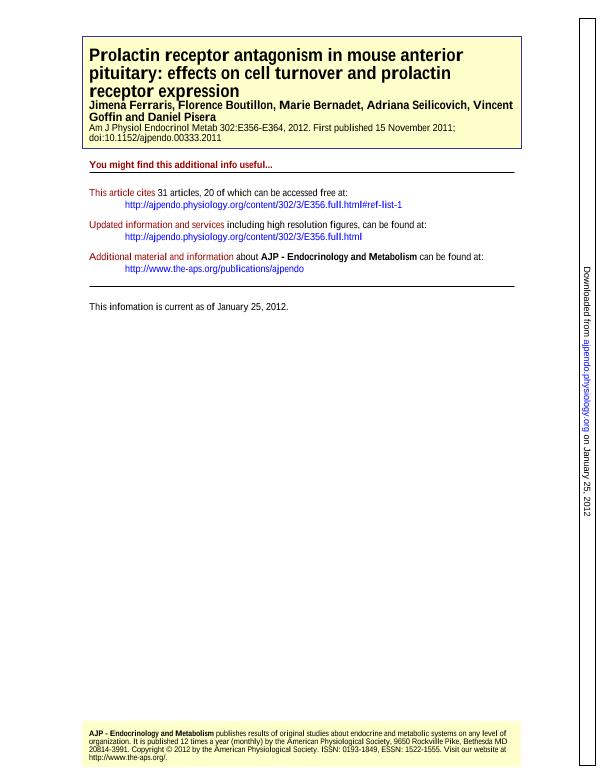Artículo
Prolactin receptor antagonism in mouse anterior pituitary: effects on cell turnover and prolactin receptor expression
Ferraris, Maria Jimena ; Boutillon, Florence; Bernadet, Marie; Seilicovich, Adriana
; Boutillon, Florence; Bernadet, Marie; Seilicovich, Adriana ; Goffin, Vincent; Pisera, Daniel Alberto
; Goffin, Vincent; Pisera, Daniel Alberto
 ; Boutillon, Florence; Bernadet, Marie; Seilicovich, Adriana
; Boutillon, Florence; Bernadet, Marie; Seilicovich, Adriana ; Goffin, Vincent; Pisera, Daniel Alberto
; Goffin, Vincent; Pisera, Daniel Alberto
Fecha de publicación:
01/2012
Editorial:
American Physiological Society
Revista:
American Journal Of Physiology-endocrinology And Metabolism
ISSN:
0193-1849
e-ISSN:
1522-1555
Idioma:
Inglés
Tipo de recurso:
Artículo publicado
Clasificación temática:
Resumen
Since anterior pituitary expresses prolactin receptors, prolactin secreted by lactotropes could exert autocrine or paracrine actions on anterior pituitary cells. In fact, it has been observed that prolactin inhibits its own expression by lactotropes. Our hypothesis is that prolactin participates in the control of anterior pituitary cell turnover. In the present study, we explored the action of prolactin on proliferation and apoptosis of anterior pituitary cells and its effect on the expression of the prolactin receptor. To determine the activity of endogenous prolactin, we evaluated the effect of the competitive prolactin receptor antagonist Δ1–9-G129R-hPRL in vivo, using transgenic mice that constitutively and systemically express this antagonist. The weight of the pituitary gland and the anterior pituitary proliferation index, determined by BrdU incorporation, were higher in transgenic mice expressing the antagonist than in wild-type littermates. In addition, blockade of prolactin receptor in vitro by Δ1–9-G129R-hPRL increased proliferation and inhibited apoptosis of somatolactotrope GH3 cells and of primary cultures of male rat anterior pituitary cells, including lactotropes. These results suggest that prolactin acts as an autocrine/paracrine antiproliferative and proapoptotic factor in the anterior pituitary gland. In addition, anterior pituitary expression of the long isoform of the prolactin receptor, measured by real-time PCR, increased about 10-fold in transgenic mice expressing the prolactin receptor antagonist, whereas only a modest increase in the S3 short-isoform expression was observed. These results suggest that endogenous prolactin may regulate its own biological actions in the anterior pituitary by inhibiting the expression of the long isoform of the prolactin receptor. In conclusion, our observations suggest that prolactin is involved in the maintenance of physiological cell renewal in the anterior pituitary. Alterations in this physiological role of prolactin could contribute to pituitary tumor development.
Archivos asociados
Licencia
Identificadores
Colecciones
Articulos(BIOMED)
Articulos de INSTITUTO DE INVESTIGACIONES BIOMEDICAS
Articulos de INSTITUTO DE INVESTIGACIONES BIOMEDICAS
Articulos(INBIOMED)
Articulos de INSTITUTO DE INVESTIGACIONES BIOMEDICAS
Articulos de INSTITUTO DE INVESTIGACIONES BIOMEDICAS
Citación
Ferraris, Maria Jimena; Boutillon, Florence; Bernadet, Marie; Seilicovich, Adriana; Goffin, Vincent; et al.; Prolactin receptor antagonism in mouse anterior pituitary: effects on cell turnover and prolactin receptor expression; American Physiological Society; American Journal Of Physiology-endocrinology And Metabolism; 302; 3; 1-2012; 356-364
Compartir
Altmétricas
Items relacionados
Mostrando titulos relacionados por título, autor y tema.
-
Le, Jamie A.; Wilson, Heather M.; Shehu, Aurora; Mao, Jifang; Devi, Y. Sangeeta; Halperin, Julia ; Aguilar, Tetley; Seibold, Anita; Maizels, Evelyn; Gibori, Geula (Society for the Study of Reproduction, 2012-01)
-
López Fontana, Gastón; Rey Echalecu, Lara Sofía ; Santiano, Flavia Eliana ; López Fontana, José Rodrigo; López Laur, José Daniel; Zyla, Leila Ester ; Valdemoros, Paula; Guerrero Gimenez, Martin Eduardo ; Fernandez Muñoz, Juan Manuel ; Gomez, Silvina Esther ; Bruna, Flavia Alejandra ; Guglielmi, Juan Manuel; Caron, Ruben Walter ; López Fontana, Constanza Matilde (Iniestares, 2021-04)



